Review: Pluribus, "We Is Us" & "Pirate Lady" | Season 1, Episodes 1 & 2
A castaway on Utopia's glittering shore
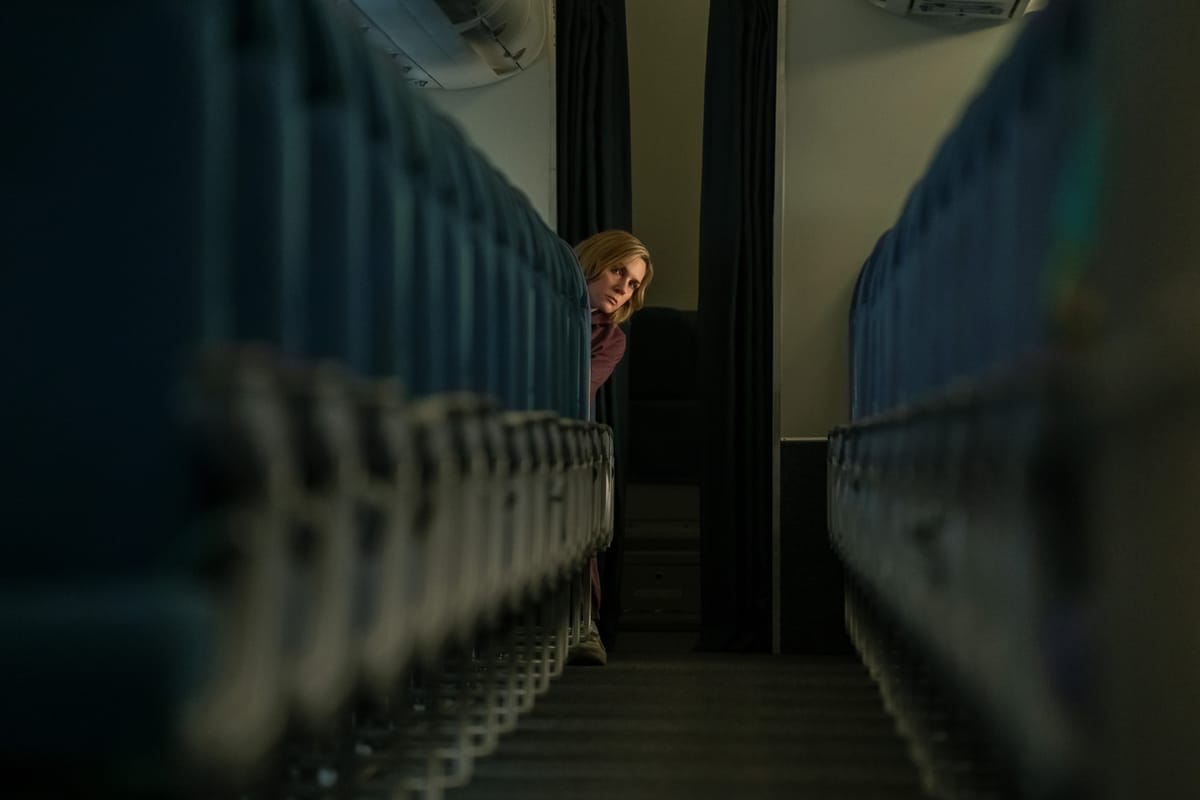
Welcome to Episodic Medium's coverage of Apple TV's Pluribus, the long-awaited return of Vince Gilligan and Rhea Seehorn. This review covers the first two episodes and is available to all for free, but Donna Bowman's subsequent reviews will be exclusively for paid subscribers. See our Calendar for our upcoming coverage through the end of the year.
I’ve always been drawn to stories of solitary survival. Wikipedia tells me that one term for this genre is robinsonade, as in Robinson Crusoe, which I read over and over as an adolescent. Yes, post-apocalyptic stories are perhaps more common or popular examples, but I almost always see those stories through the lens of the robinsonade. The emptier the world, the more I gravitate toward it.
And in the pilot episode of Pluribus, the world empties out with incredible speed. Rhea Seahorn’s Carol stands in a cul-de-sac atop a New Mexico hill, the faux-adobe villas of this wealthy neighborhood tastefully spaced, and stares down at glittering lights, having just been told only 11 individuals are left in the world. Every other human is now a “pod person,” as Carol disdainfully puts it—infected with a virus beamed to earth as digital information from the stars, intercepted and interpreted by scientists, manufactured, and deliberately spread.
The world still populated, of course, full of human hosts for the alien virus. But it still feels sparse, as Carol navigates around mindless drones going about their hive-mind business. Hundreds of millions were killed, we are later told, when the takeover program had to be accelerated due to military intelligence. From the first moments of the cold open to Carol’s complete isolation, a countdown tells us 439 days pass. As apocalypses go, even as alien invasions go, it’s a slow one.
But what you’ve gotta love about a Vince Gilligan pilot is that he never makes us wait. In rapid-fire scenes, the message is discovered, the virus synthesized, the containment compromised, and the biological agent disseminated. At each stage, there is suspense, horror, humor, and character. Radio astronomers tossing a football around a trailer in the desert. A lab tech thoughtlessly stripping off a protective glove before picking up a comatose rat. A motley crew of scientists, security guards, janitors, soldiers, and delivery folks methodically packing petri dishes full of virus. And finally, on Carol’s TV, an undersecretary of agriculture standing at the presidential podium as a C-SPAN chyron assures Carol YOUR LIFE IS YOUR OWN. And we’re off and running.
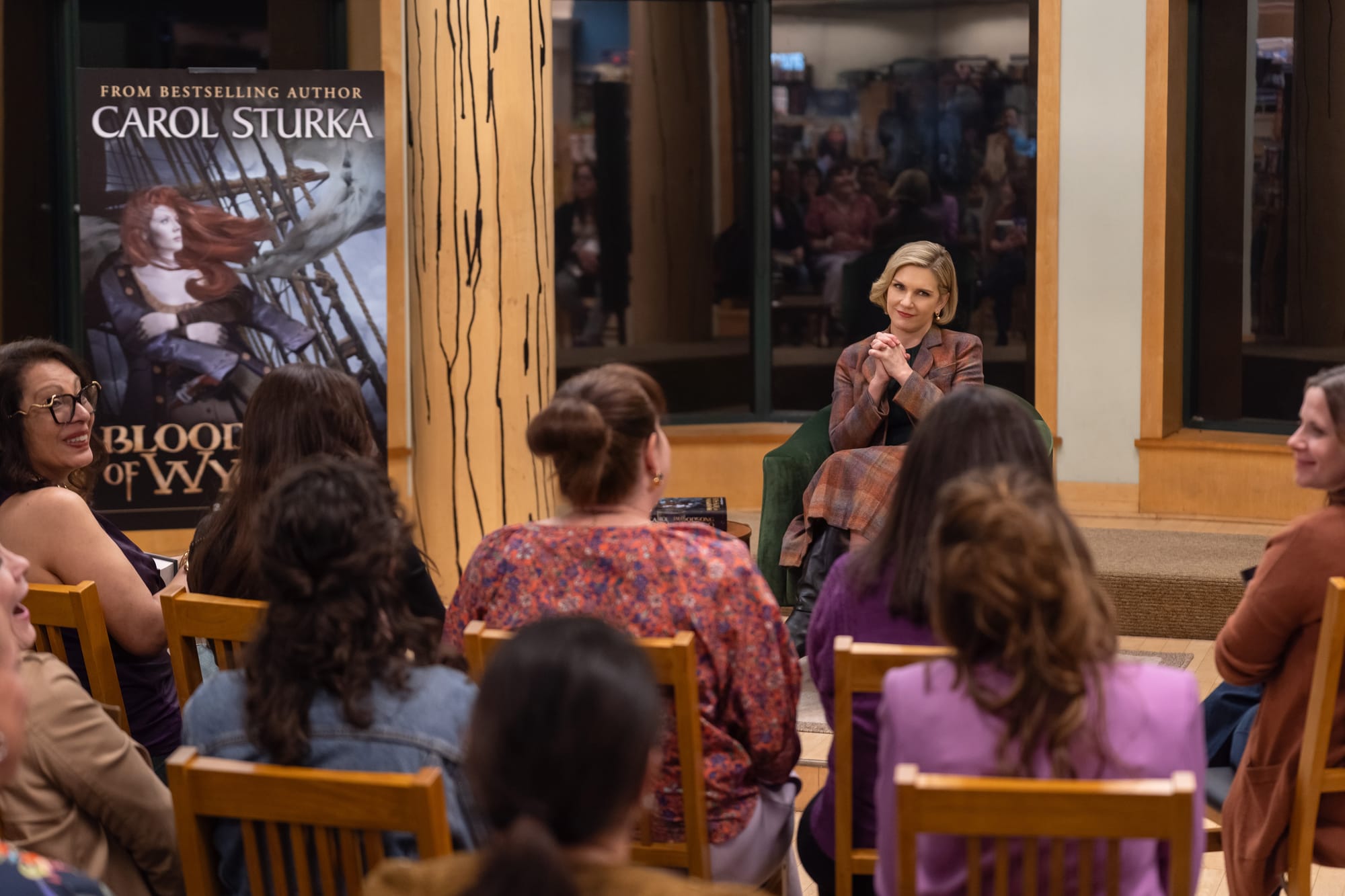
That’s how the setting is built in the first episode, “We Is Us.” But Gilligan has something else to build, and that’s his main character, the Robinson of Pluribus. Carol is a romance writer with a very successful series featuring Raban, a dashing pirate in the maritime world of Wycaro. Idolized by middle-aged women and um-actually’d by earnest nerds, she smiles at everyone who approaches the signing table on the last stop of her book tour. But as her partner and manager Helen knows, she despises her readers and hates her career. Maybe she’s always been a misanthrope; maybe the stress of staying closeted, or her disappointment in what she’s done to her art, has curdled her outlook. But it’s driven her to drink—her car ignition is even locked behind a breathalyzer—and she avoids contact with the source of her wealth and fame. Walking past an airport newsstand where her books are on a bottom shelf, she stops and side-eyes until Helen goes over and moves them to a more prominent position.
How will this sour, self-hating woman respond to her solitude? With seething rage, as we see in the second episode, “Pirate Lady.” The hive mind sends a woman with a striking resemblance to Raban (if Raban were a woman, as was Carol’s original intention) all the way from Tangiers to Albuquerque in a truly remarkable cold open. Her mission is to open a more personal line of communication to Carol, who occupies a special position among the remaining unpodded. Carol’s negative emotions make the hive mind short out somehow; every drone on earth falls over and twitches when she flies into a temper. Hence the need to soothe her, keep her happy, cater to whatever she wants. And what Carol wants is to organize a resistance.
Every robinsonade must eventually succumb to the need for another character. Whether it’s Friday’s footprints on the beach, Tom Hanks making a friend out of a volleyball, or Richard Parker on Pi’s boat, the castaway finds or invents an interlocutor. My biggest question for the remaining seven episodes of Pluribus is how much Carol will separate herself—by temperament, purpose, or emotional brokenness—from the other five English speakers she demands to meet.
Immediately it is clear they are different. Carol is alone; the others are surrounded by family members (or in Diabaté’s case, an entourage) who have been turned into alien hosts. The others seem much less disturbed by what Carol characterizes as the end of the world, and they are in no rush to save it. They’ve entered into relationships with their new overlords, and wonder why Carol isn’t curious about the experiences of the drones around her. (“You don’t ask the drug dealer to describe their heroin,” she snaps back.) And setting the regrettable losses of the invasion aside, isn’t the world a better place? “All zoos are empty, all dogs off their chains. Peace on earth!” Diabaté enthuses.
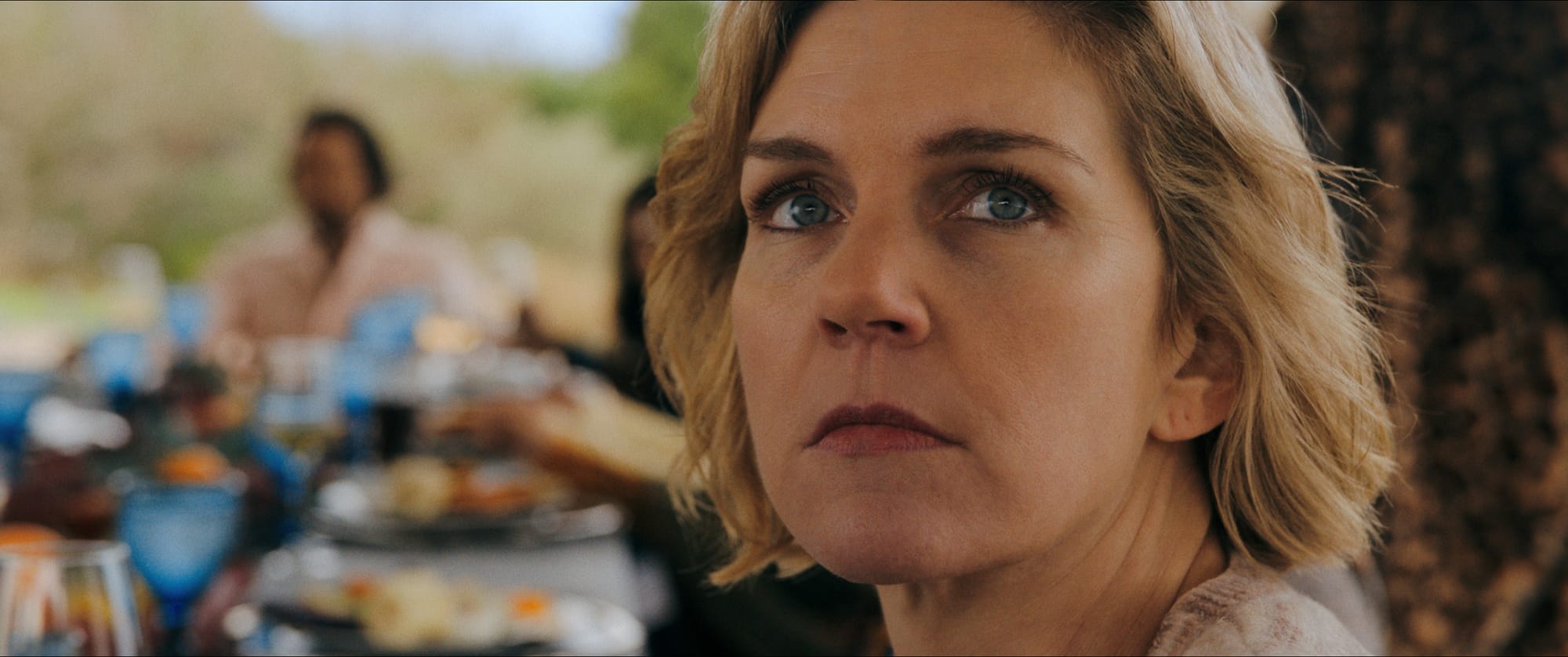
What defines the rest of the remnant population, in Carol’s eyes, is their easy capitulation. Every small downside (meat’s gonna run out soon since the Joined folks won’t kill, for example) is neatly overcome (we’ll just boil the lobsters ourselves). The fantasy of being catered to by millions of agents of an omnipotent overlord seduces the others immediately. It’s Diabeté who realizes this power most fully, demanding Air Force One as his ride, assembling a bevy (harem?) of beautiful drones, and taking off for a Vegas residency in Elvis’ penthouse. To Carol, they are unforgivably selfish in thinking about themselves and not the species; to them, Carol is petulantly selfish in holding onto the anger that kills millions every time she indulges it.
At the end of the second episode, Carol makes a choice—why, we don’t yet know. Rather than continuing her robinsonade with her personal Friday, making her own way (until it’s too much) in a world she can pretend is empty (until the podders forget they shouldn’t intrude), she flags down Air Force One and joins the other Immunes. To continue the argument? To concede?
Maybe just to have other real people to talk to. JUST DIAL 0, 24/7 the TV told her on that first night. But picking up the phone to obsequious jailers ain’t it. The only hope for a Robinson is when Friday talks back.
Stray observations
- Other favorite robinsonades for which I regularly evangelize: Elizabeth Moon’s Remnant Population, a SF story about a woman who stays behind when her fellow colonists evacuate the planet, led me (via Moon’s comments about her influences) to The Wall by Marlen Haushofer. Both highly recommended. A stray mention online years ago led me to a New Zealand property rental site where An Island to One’s Self was available for download. This 70’s-era memoir by Tom Neale of his time alone on a South Sea island has never left my imagination.
- I look forward to finding out more about the world of Wycaro, the site of Carol’s “romantic speculative fiction.” Why is purple the signature color? How hard do those “WINDS” blow? Why does the Mercator have a mizzenmast despite being a two-masted schooner?
- “Raban is back and yummier that ever,” Helen reads from the book’s online reviews, expertly rendering [sic] with a silent double-take.
- While we’re watching Carol learn what kind of world she’s been plunged into, we’re also watching the hive mind learn how to treat Carol. Don’t: Have the neighbor kids remind her of where she hid the spare key in April 2016. Do: Provide a pickax to facilitate gravedigging through the volcanic sublayer. Don’t: Offer to get her the pepper bacon from the Inn at Little Washington for breakfast.
- Carol stumbles upon the thing that might make the hive mind implode like a computer faced with an irresolvable paradox in Star Trek. Their goal is to “figure out why you are different, so you can Join us,” as the undersecretary says that first night. It’s the differences among the remaining individuals that almost breaks Zosia at the end of episode 2. “If we were to choose” to do what Carol wants in opposition to what Diabaté wants, “it would hurt one of you, and we can’t do that.” Their avowed aversion to harming sentient life might be their Achilles heel.
- Austin Considine’s New York Times article about a set visit (gift link) astutely points out the gigantic scale of the show—and the budget that implies. Gilligan uses that to put us directly in Carol’s shoes. The hive mind can do anything, from using a C-130 to get one woman to Albuquerque to coptering in a garden backhoe for Helen’s grave. We are just as dumbfounded by their speed and unlimited resources as our protagonist. And that scale is portrayed not just in props and settings, but in the cinematic language of time and movement. My favorite example is Zosia walking from the cockpit of a gigantic airliner, past the luxury first class pods, all the way to the very back row where Carol huddles defiantly, refusing to indulge in what this brave new world offers her.
- Speaking of Zosia, Laxmi lands a real zinger when she points out that Carol hasn’t even bothered to ask “pirate lady” her name. That’s certainly in the grand robinsonade tradition; Crusoe never hesitated to claim naming rights over Friday, too.
- There’s plenty of DNA from other stories here—The Day The Earth Stood Still, with its peace-enforcing aliens; “Children of the Corn,” with the ability to banish and harm with anger; and the direct references to Invasion of the Body Snatchers.. I’d love to hear what parallels came to mind for you.
- Needle drops: When Zosia arrives at the ABQ airport, a Muzak version of Earth, Wind & Fire’s “That’s the Way of the World” is playing in the terminal. The credits song is a cover of Julian Lennon’s “Strange Days.” (Most peculiar, mama!)
- Don’t worry about drinking the water. The supervisor at the Aquafina plant in Winston-Salem when it was bottled says it’s fine!
- “I’ve seen this movie, and it does not end well.” Stand in your truth, Carol.

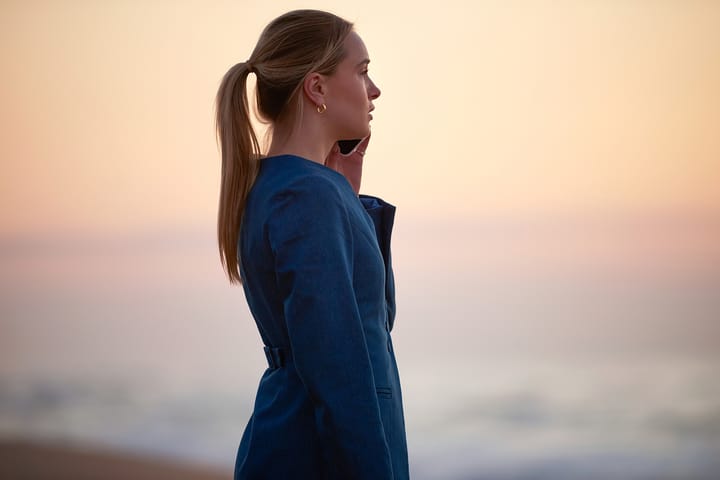
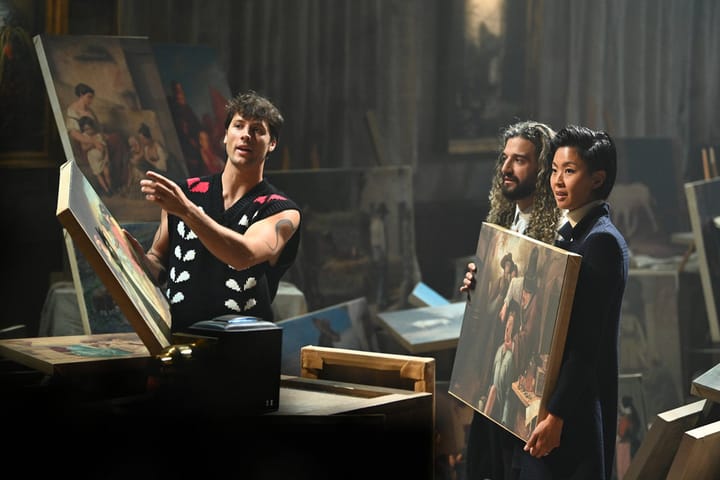

Comments ()